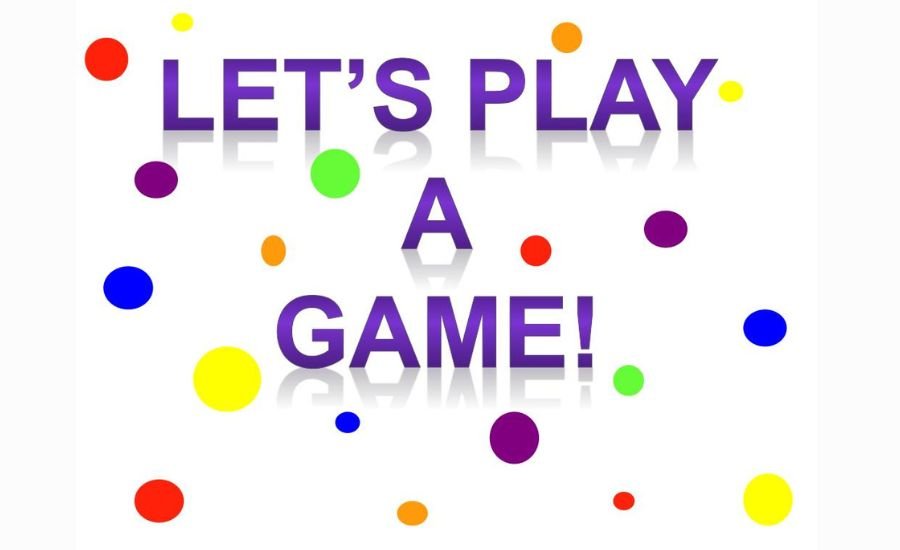“Lets play a game! Have you ever found yourself wanting to make everyday tasks more fun? At IdeaNestle, we believe that games can add excitement to any activity. Whether it’s chores, learning new things, or just passing the time, turning tasks into games can make them enjoyable and engaging. Today, we will explore how you can bring a playful spirit to your daily life and make it more exciting with ‘Let’s Play a Game’!”
What Does “Lets Play a Game” Really Mean?
When we say, “Let’s play a game,” it doesn’t always have to be about board or video games. It simply means turning everyday tasks into something fun and exciting. Whether it’s chores, studying, or even doing simple exercises, we can turn them into games to make them more enjoyable. By adding a playful approach, tasks that seem dull can become much more engaging and less of a chore. For example, timing how fast you can clean your room or racing to finish your homework can make these activities more enjoyable and hassle-free.
Why You Should Add a Little Fun to Your Daily Routine
Adding fun to your daily routine can make life more enjoyable and less stressful. It helps break up the monotony of everyday tasks and keeps you motivated. Whether it’s through playing games or setting challenges for yourself, a playful attitude can make even the simplest tasks feel like an adventure. Think about setting a goal to clean your desk faster than yesterday or to organize your bookshelf like a game. This approach not only makes tasks more fun but also helps you stay on track with your goals.
Turning Chores into a Game: Tips and Tricks

Chores can be dull, but when you turn them into a game, they suddenly become fun! One way to do this is by setting challenges for yourself. For instance, challenge yourself to do dishes as quickly as possible or see if you can put away groceries faster than usual. You can also set up mini rewards like stickers or small treats to celebrate completing tasks. Another idea is to compete with family members or friends to see who can finish their chores first. This friendly competition can make chores less chore and more of a game!
The Benefits of Playing Games in Learning
Playing games can be a great way to learn new things. When we say, “Lets play a game,” it doesn’t just mean having fun—it can be a powerful tool for learning, too. Games can make studying more engaging and help improve memory and concentration. For instance, if you’re learning a new language, using flashcards or language-learning games can make it easier and more enjoyable. By turning learning into a game, you can better retain information and make studying an exciting challenge rather than a tedious task.
How to Make Your Study Time More Enjoyable with “Lets Play a Game”
Making study time more enjoyable can be as simple as turning it into a game. You can set goals for yourself, like finishing several math problems before a timer goes off. You can also create a reward system where, after every 10 issues, you take a short break to play a game or do something fun. This approach helps you stay focused and makes learning more interactive. By setting up these mini-challenges, you turn studying from a tedious task into an engaging activity that enables you to learn more effectively.
From Boredom to Excitement: The Magic of Gamification
Gamification is turning something boring into something exciting by adding play elements. By saying, “Lets play a game,” we can apply this concept to many aspects of life. Whether it’s at school, work, or even at home, adding a bit of gamification can make tasks more fun. For example, at school, teachers can use game-like quizzes to help students learn better. At work, setting goals and challenges for employees can boost productivity. Using gamification, we transform everyday tasks into opportunities for fun and learning.
Boosting Teamwork with “Lets Play a Game”
Teamwork can be improved by adding a playful element to it. When we say, “Lets play a game,” it can mean setting up team-building activities that encourage collaboration and communication. For instance, you can play games that require teams to solve problems together, like escape room challenges or strategy games. These activities help team members get to know each other better, improve their communication skills, and learn how to work together more effectively. By turning teamwork into a game, we make it more enjoyable and productive.
Games to Play with Friends: Adding Fun to Every Gathering

When friends get together, it’s always fun to have a game to play. Whether it’s a board game, a card game, or even an outdoor activity, games add excitement to social gatherings. By saying, “Lets play a game,” we can suggest activities everyone can enjoy. For example, you could organize a trivia night, play charades, or have a friendly competition with a sports game. Games bring people together and make gatherings more memorable and fun. It’s a great way to bond with friends and make every meeting an enjoyable experience.
Using “Let’s Play a Game” to Break the Ice
When meeting new people, it can be a bit awkward at first. But saying, “Lets play a game,” can be a great way to break the ice. You can start with simple games like Two Truths and a Lie or a quick round of 20 questions. These activities help everyone relax, get to know each other better, and have fun. It’s a great way to make new connections and turn an uncertain beginning into a positive experience. By starting with a game, you set the tone for a friendly and enjoyable interaction.
Games for Kids: Learning Through Play
Kids love playing games, and it’s not just for fun—it’s also a way to learn new things. By saying, “Lets play a game,” we can create a fun learning environment for kids. Whether it’s educational board games, online quizzes, or outdoor challenges, games can teach kids essential skills like problem-solving, teamwork, and creativity. For example, games that involve counting, sorting, or matching can help with math skills. Playing games not only makes learning enjoyable but also keeps kids engaged and eager to learn more.
“Lets Play a Game”: Making Exercise Fun for Everyone
Exercise doesn’t have to be boring; it can be a game! By saying, “Lets play a game,” we can turn workouts into enjoyable activities. Whether it’s playing a game of tag, doing a dance-off, or organizing a mini-sport tournament, exercise becomes more exciting when it’s fun. This approach helps people stay motivated to stay active and healthy. By adding a playful element to exercise, it becomes less about “working out” and more about having fun and staying active in a way that everyone can enjoy.
Creative Ideas to Transform Your Weekends with Games
Weekends are a great time to relax and have fun. By saying, “Lets play a game,” we can turn weekends into opportunities for fun activities. You can organize game nights, have family game days, or even plan a day trip to a place where you can play games outdoors. From board games to scavenger hunts, there are plenty of ways to enjoy the weekend with games. This approach adds variety to your weekends and makes them more exciting and memorable.
Games that Teach Valuable Skills: “Lets Play a Game” Approach
Games can teach valuable skills, and by saying, “Lets play a game,” we highlight their educational potential. Whether it’s strategic thinking, decision-making, or time management, games can help develop these skills in a fun and engaging way. For instance, playing strategy games can improve problem-solving, while role-playing games can enhance communication skills. By focusing on the learning aspect of games, we can turn them into tools for personal and academic growth.
Turning Family Time into Quality Time with Games

Family time is unique, and by saying, “Lets play a game,” we can make it even more enjoyable. Games bring families together and create lasting memories. From board games to outdoor sports, there are plenty of options. By saying, “Lets play a game,” we encourage spending quality time with loved ones, building bonds, and creating fun experiences. Family game nights are a great way to strengthen relationships and have fun as a group.
“Lets Play a Game”: A New Way to Approach Boredom
When boredom strikes, saying, “Lets play a game” can be a great way to add some excitement. Whether it’s indoors or outdoors, there are countless games to choose from that can turn boredom into an opportunity for fun. You can try new things like a card game, board game, or creative project. This approach helps you make the most of your free time and turns it into something enjoyable and productive. By saying, “Lets play a game,” we take a step toward making life more fun and less tedious.
Conclusion
Playing games doesn’t have to be just about having fun; it can also be a great way to learn new things and make everyday tasks more enjoyable. Whether you’re turning chores into a game, using games to break the ice with new friends, or finding creative ways to stay active, adding a playful approach can make a big difference in how you experience life. By saying, “Lets play a game,” we open opportunities for creativity, learning, and bonding. So next time you face a tedious task or have some free time, why not try it? You might discover a new way to enjoy life and make things more exciting!
Must-Have Information: University High School Football
FAQs
Q: What does “Lets Play a Game” mean?
A: “Let’s Play a Game” typically means engaging in an activity that involves rules and objectives, often for fun or learning. It can range from physical games like sports to mental exercises or problem-solving tasks.
Q: Why should I say “Let’s Play a Game” for simple tasks?
A: Saying “Let’s Play a Game” can make simple tasks more enjoyable and engaging. It helps break the monotony and encourages creativity, turning everyday chores into an opportunity to have fun and learn something new.
Q: Can “Let’s Play a Game” be used for learning?
A: Yes, absolutely! “Let’s Play a Game” is an excellent way to make learning more interactive and less like traditional studying. It can involve educational games, quizzes, or challenges that help reinforce knowledge entertainingly.
Q: How can games help in building relationships?
A: Games are a great way to build relationships as they provide a shared activity that fosters communication, teamwork, and bonding. Whether playing a board game with friends or an online multiplayer game with family, games create opportunities for interaction and fun.
Q: What types of games can be played with “Let’s Play a Game”?
A: The types of games can vary widely. They can include board games, card games, sports, video games, brain teasers, and even DIY activities. The goal is to choose something that matches the participants’ interests and the context of the activity.
Q: How can I incorporate “Let’s Play a Game” into learning at home?
A: You can incorporate “Let’s Play a Game” by turning study sessions into quizzes, scavenger hunts, or educational challenges. Use flashcards, trivia, or fun worksheets to make learning a game, which can make it more enjoyable for children and adults alike.
Q: Is “Let’s Play a Game” just for children?
A: No, “Let’s Play a Game” is for everyone. While it’s an excellent way for children to learn and have fun, adults can benefit from the same approach. Games can make tasks more engaging, help relieve stress, and encourage creativity and teamwork at any age.
Q: How can “Let’s Play a Game” improve productivity?
A: “Let’s Play a Game” can improve productivity by breaking tasks into smaller, more manageable steps. It helps maintain focus, provides motivation, and makes the process more enjoyable, which can lead to better results and efficiency.
